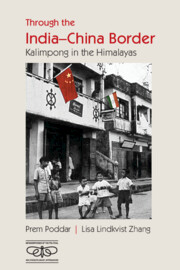Book contents
- Frontmatter
- Dedication
- Contents
- List of Figures
- Preface
- Acknowledgements
- List of Abbreviations
- Note on Translation and Transliteration
- Maps
- 1 Kalimpong as Interface: (Post)Colonial and Transcultural
- 2 Kalimpong as Metonym: India–China Correlation
- 3 Chinese (and Tibetan) Certification in Himalayan India: Foreigner Registration Files from the 1940s to the 1960s
- 4 Espionage, Intrigues and Politics: Kalimpong Chung Hwa School as Playhouse
- 5 Shangri-La (Gyalthang) to Kalimpong: The Road of Trade, Transculture and Conflict
- 6 Not the Last Word: An Inconclusion
- Glossary
- Bibliography
- Index
6 - Not the Last Word: An Inconclusion
Published online by Cambridge University Press: 28 November 2024
- Frontmatter
- Dedication
- Contents
- List of Figures
- Preface
- Acknowledgements
- List of Abbreviations
- Note on Translation and Transliteration
- Maps
- 1 Kalimpong as Interface: (Post)Colonial and Transcultural
- 2 Kalimpong as Metonym: India–China Correlation
- 3 Chinese (and Tibetan) Certification in Himalayan India: Foreigner Registration Files from the 1940s to the 1960s
- 4 Espionage, Intrigues and Politics: Kalimpong Chung Hwa School as Playhouse
- 5 Shangri-La (Gyalthang) to Kalimpong: The Road of Trade, Transculture and Conflict
- 6 Not the Last Word: An Inconclusion
- Glossary
- Bibliography
- Index
Summary
There is neither a first nor last word and there are no limits to the dialogic context (it extends into the boundless past and the boundless future). Even past meanings, that is, those born in the dialogue of past centuries, can never be stable (finalized, ended once and for all)—they will always change (be renewed) in the process of subsequent, future development of the dialogue.
—Mikhail Bakhtin, ‘Methodology for the Human Sciences’China as an idea and entity is everywhere today, both materially and symbolically. One way of looking at it is to address the present and future in a world that is profoundly interconnected, although with a resurgence in the idea of borders and barriers. We have a changed mediascape, our planet's sense of brokenness, isolation and fragmentation still infusing the post-Brexit and post-Trump world of nationalism and populist politics with troubling irresolution, but we must also recognise events along the Silk Roads since 2015, where there has been a narrative of strengthening ties, cooperation and a network of relationships with immense global reverberations and continual shifts. This book is not so much clearly concerning these complex geopolitics, notably vis-à-vis India and China, but about looking back and looking forward, in intersecting timeframes, at how these relationships are effected and affected, constrained and cracked. The book could have taken a different form but is confined to relating the representations and shenanigans around a border town during an exacting period.
The burden of the book has been to trace how China figured in the sociopolitical imaginary of the British and thereafter in the postcolonial Indian state, as well as in communist literature in China itself. More specifically, the book considers the Kalimpong border regions between the 1940s and the 1960s (also a consequence of its earlier history of settlement in the late nineteenth and early twentieth centuries) as its main case study to explore these issues. The book's primary subject remains—even more so in the twenty-first century—relevant in terms of the border claims in the region and the anxieties that those provoke. The existential angst is very much present, one could say, in relation to the people of Chinese origin but Indianised in varying degrees, still living in the area or in the diaspora of Kalimpong/Indian Chinese that proliferated around the world.
- Type
- Chapter
- Information
- Through the India-China BorderKalimpong in the Himalayas, pp. 218 - 230Publisher: Cambridge University PressPrint publication year: 2025

